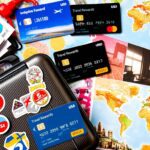As a seasoned traveler, I’ve learned that even the best plans can go wrong if you’re not careful with money. Unexpected fees and overpaying for insurance can lead to financial trouble. But don’t worry, we’re here to help. We’ll show you how to avoid these common mistakes, so your next trip is worry-free and full of joy.
Key Takeaways
- Understand and avoid foreign transaction fees when using credit cards
- Research alternative payment methods to save on exchange rates and fees
- Notify your bank before traveling to avoid account freezes or unexpected charges
- Monitor currency exchange rates and find the best deals when converting money
- Diversify your payment options to minimize the impact of lost or stolen cards
Overlooking Foreign Transaction Fees
Traveling abroad is exciting but can also be costly. Many travelers overlook foreign transaction fees on credit cards and other payment methods. These fees, from 1% to 3% of the total, can quickly increase your expenses.
Understanding Credit Card Charges
Before your trip, learn about your credit card’s foreign transaction fees. Some cards don’t charge these fees, while others do. Knowing this can help you choose the right payment method and avoid surprises.
Exploring Alternative Payment Methods
To reduce foreign transaction fees, consider debit cards or prepaid travel cards. They might have lower or no fees, helping you save money. Some travel credit cards also offer no foreign transaction fees and extra rewards for international purchases.
| Payment Method | Foreign Transaction Fees | Other Considerations |
|---|---|---|
| Credit Card | Typically 1-3% | Some cards waive these fees |
| Debit Card | Typically lower or no fees | May have ATM withdrawal fees |
| Prepaid Travel Card | Typically no fees | Requires pre-loading funds |
Understanding foreign transaction fees and exploring other payment options can save you money. Being informed and choosing wisely can help you travel with confidence and a full wallet.
Failing to Notify Your Bank
Before you travel, tell your bank about your trip. This simple step can save you from a lot of trouble. By letting your bank know, your transactions will be approved, and you can use your money freely.
If you don’t tell your bank, they might block your card thinking it’s fraud. This can cause delays and extra costs. Banks watch for unusual spending, and if they don’t know you’re away, they might think your transactions are suspicious.
- Notify your bank before traveling to avoid bank account issues when traveling and prevent fraud while traveling.
- Give your bank the dates and places of your trip. This helps them watch your account and avoid blocking your card.
- Think about setting up travel alerts with your bank. It makes things easier and keeps your money safe while you’re away.
By telling your bank before you go, you can relax and enjoy your trip. You’ll know your money is in good hands.
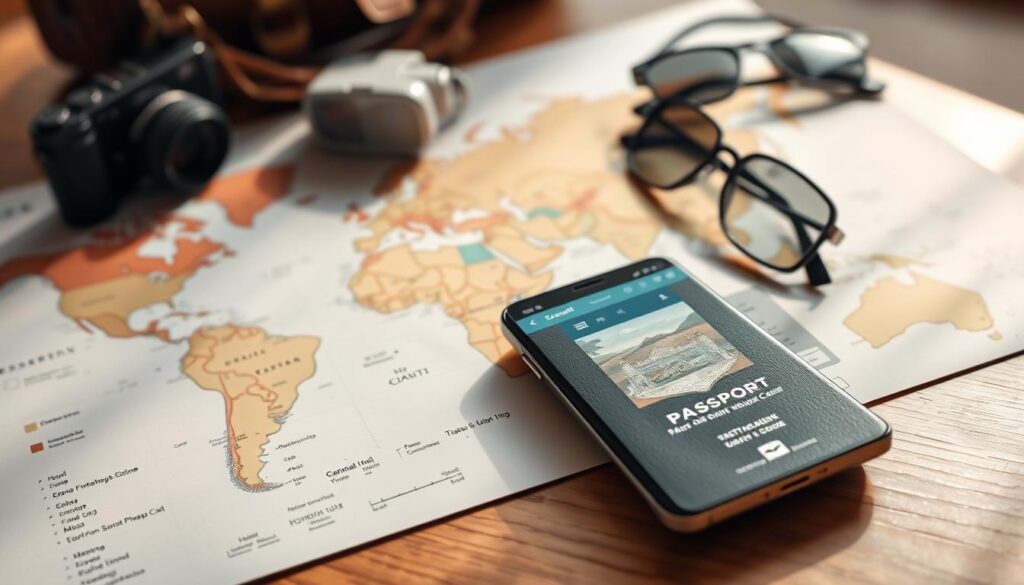
“Don’t let a forgotten bank notification ruin your vacation. Stay one step ahead and keep your finances secure while you explore the world.”
Neglecting to Research Currency Exchange Rates
Many travelers forget to research currency exchange rates before their trip. Not checking exchange rate changes can cause big losses. Before you go, look up the current rates and watch for any changes. This way, you can find the best places and times to exchange your money, saving you money.
Monitoring Fluctuations
Exchange rates can change a lot, sometimes every hour. Watching these changes helps you spend more and lose less money. Some people use apps or websites to keep up with rates and find the best deals.
Finding the Best Rates
- Compare exchange rates across different providers, such as banks, currency exchange bureaus, and online platforms.
- Consider the fees and commissions associated with each option, as they can significantly impact the final exchange rate you receive.
- Look for promotional offers or discounts that can help you get the best currency exchange rates for your travel needs.
By researching currency exchange rates and watching for changes, you can save a lot of money. This simple step can make your trip more affordable and rewarding.
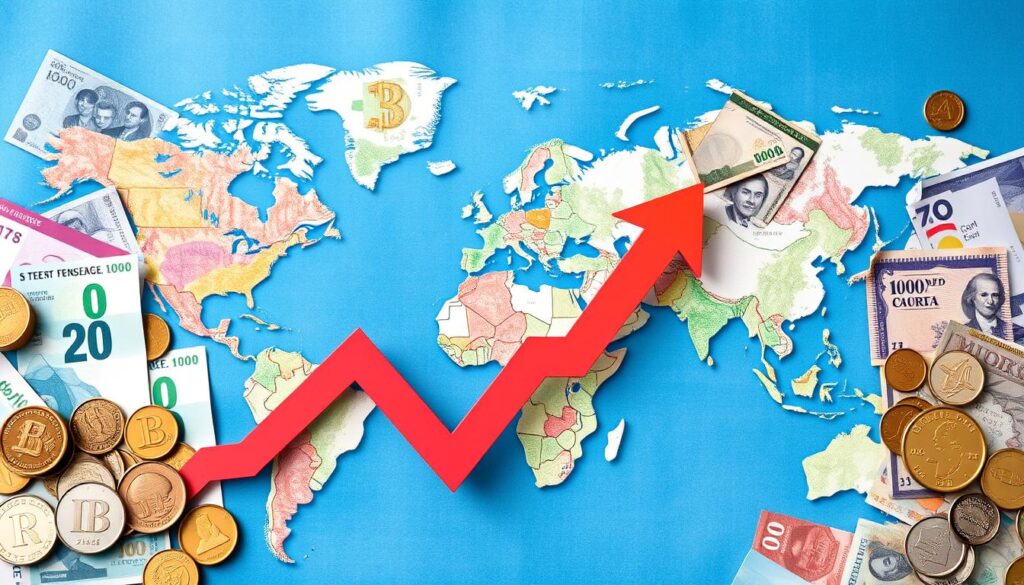
Relying Solely on Credit Cards
Traveling with credit cards can be easy and safe. But, relying too much on them can cause problems. If your card gets lost or stolen, you might lose access to your money. This could ruin your trip.
To avoid this, it’s smart to carry different ways to pay. Mix cash, debit cards, and credit cards in your wallet.
Diversifying Payment Options
Using different payment methods helps you stay safe. It means you have a backup if one way to pay fails. This way, you’re not stuck with just credit cards.
It lets you pick the best payment for each situation. Use cash for small buys and credit cards for big ones.
- Carry a variety of payment options, including cash, debit cards, and credit cards.
- Avoid relying solely on credit cards to make all your purchases while traveling.
- Consider the benefits and drawbacks of each payment method, and choose the one that works best for your specific needs and location.
| Payment Method | Advantages | Disadvantages |
|---|---|---|
| Cash |
|
|
| Credit Cards |
|
|
| Debit Cards |
|
|
“By diversifying your payment options, you can avoid the risks of over-reliance on credit cards and ensure you have the funds you need to make your trip a success.”
When you travel, it’s key to use many payment methods. This way, you’re not stuck with just credit cards. It keeps your money safe and lets you enjoy your trip without worry.
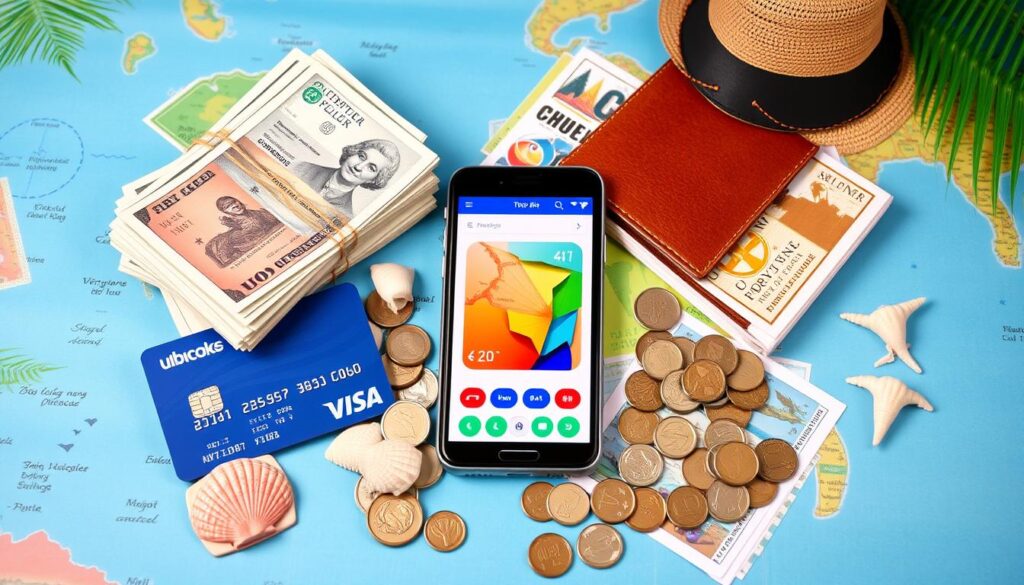
Overpaying for Travel Insurance
Travel insurance can be very helpful for your trips. But, it’s important not to pay too much for it. Before you buy a policy, think about what you really need. Look at your travel plans and any insurance you already have.
Evaluating Coverage Needs
Think about where you’re going, how long you’ll stay, and what you’ll do. Do you need coverage for trip cancellations, medical emergencies, or lost luggage? Knowing what you need helps you avoid buying too much.
Comparing Providers
After figuring out what you need, look at different insurance providers. Compare the travel insurance costs, what’s covered, and the policy details. This way, you can find the best deal that fits your travel insurance needs.
“Carefully evaluating your travel insurance needs and comparing providers can help you find the right coverage at the best price.”
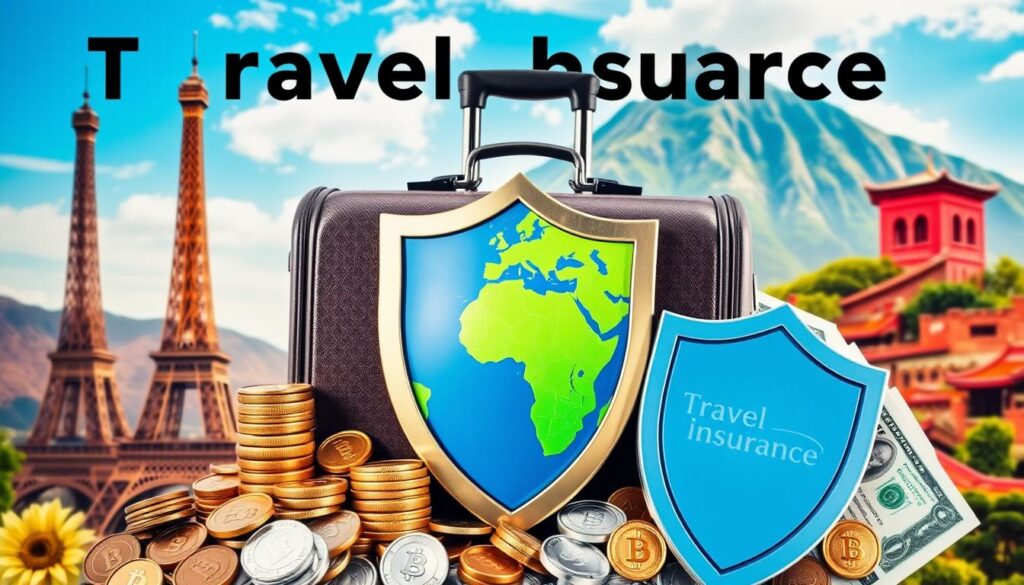
By evaluating your coverage needs and comparing travel insurance providers, you can find the best balance. This ensures you get the most value from your travel insurance.
Not Budgeting for Hidden Costs
Traveling can be thrilling, but hidden costs can sneak up on you. Airport taxes, resort fees, and local transport costs can quickly add up. To avoid surprises, it’s key to budget for hidden travel costs when planning your trip.
Researching your destination is a crucial step in anticipating unexpected travel expenses. Look into local taxes, fees, and charges like tourism taxes, baggage fees, or mandatory gratuities. By planning for additional costs when traveling, your budget will cover the true cost of your trip, avoiding financial stress.
- Research common local taxes, fees, and charges in your destination
- Factor in transportation costs, such as taxis, rideshares, or public transit
- Anticipate and budget for unexpected expenses, like medical emergencies or lost/stolen items
By budgeting for hidden travel costs and anticipating unexpected travel expenses, you can enjoy your vacation without worry. This way, you’ll plan for additional costs when traveling and ensure your budget covers everything.
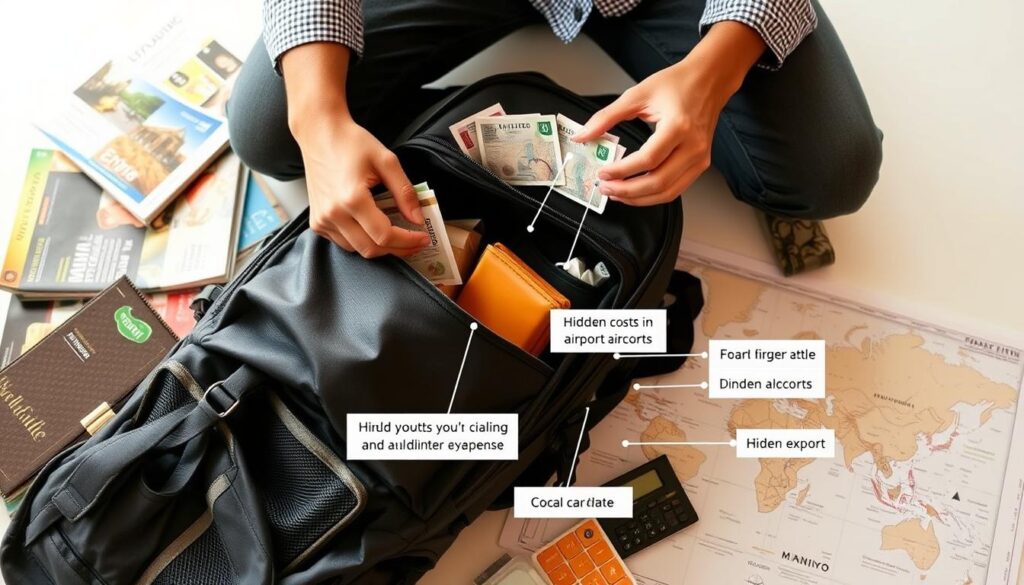
Common Travel Money Mistakes
Traveling is exciting, but it also has financial challenges. There are many common money mistakes travelers face. Knowing these can help you manage your money better and enjoy your trip more.
One big mistake is spending too much on souvenirs and other things you don’t need. It’s easy to get carried away with new places and cultures. To avoid this, make a budget for souvenirs and stick to it.
Another mistake is not keeping track of your spending. Without knowing where your money goes, you can easily spend more than you planned. Use a budgeting app or keep a detailed record of your spending.
- Overspending on souvenirs and non-essential purchases
- Failing to track expenses during the trip
- Neglecting to convert currency before arriving at your destination
Lastly, many forget to exchange their money before traveling. This can lead to bad exchange rates and extra fees. Research the local currency and exchange rates before you go. Consider exchanging some money before your trip.
| Common Travel Money Mistake | Description | Tips to Avoid |
|---|---|---|
| Overspending on souvenirs | Impulse buying and excessive spending on non-essential items | Create a realistic souvenir budget and stick to it |
| Failing to track expenses | Losing track of spending and exceeding the travel budget | Use a budgeting app or keep a detailed expense record |
| Neglecting to convert currency | Unfavorable exchange rates and additional fees when exchanging on arrival | Research local currency and exchange rates before the trip, and convert funds in advance |
By knowing these common money mistakes, you can avoid them and have a better trip. Stay alert, plan ahead, and enjoy your travels without worrying about money.
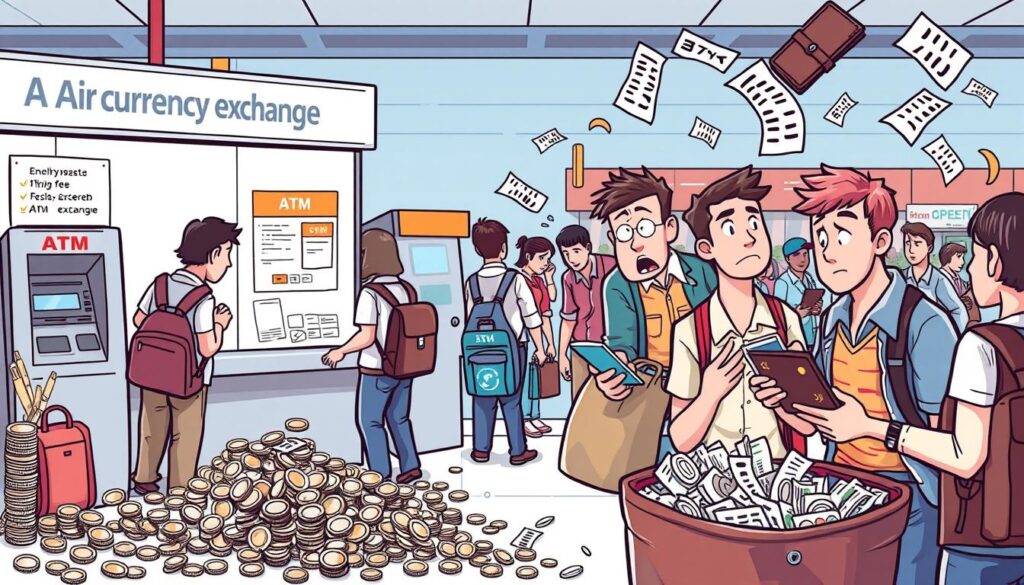
Carrying Large Amounts of Cash
Traveling with cash can be tricky. It’s good for quick expenses and surprises, but big amounts are hard to carry and not safe. You need to balance cash safety with easy payment options.
The Risks of Carrying Too Much Cash
Cash can get stolen, lost, or damaged. It’s hard to exchange foreign money when you get home. Carrying a lot of cash also makes you a target for thieves. If your cash is gone, you can’t get it back easily.
Striking a Balance
To avoid cash risks, balance it with other payment methods. Carry just enough cash for taxis, tips, and small buys. Use cards for bigger deals. This way, you stay safe and convenient.
| Payment Method | Advantages | Disadvantages |
|---|---|---|
| Cash |
|
|
| Credit/Debit Cards |
|
|
By balancing cash and cards, you get the best of both worlds. You stay safe and have easy payment options. This way, you can enjoy your trip without worrying about money.

Forgetting About Foreign ATM Fees
Withdrawing cash from foreign ATMs can be very expensive. These transactions often cost between $2 to $5 per withdrawal. You also might face extra charges from your bank. To avoid these fees, it’s key to check your bank’s policies and find fee-free ATM networks in your travel destinations.
Minimizing Withdrawal Costs
Using credit unions or online banks can help you save money. They often offer ATM fee rebates. This means you can withdraw cash without extra charges. Some credit cards also let you make a few free ATM withdrawals each month when you’re abroad.
| Strategies to Avoid Foreign ATM Fees | Benefits |
|---|---|
| Use a credit union or online bank with ATM fee rebates | No additional charges for foreign ATM withdrawals |
| Utilize credit cards with free international ATM withdrawals | Avoid foreign ATM fees for a certain number of transactions per billing cycle |
| Withdraw larger amounts at a time to minimize the impact of fees | Reduces the number of transactions and overall fees incurred |
Being aware of foreign ATM fees and looking for other ways to pay can save you money. This smart planning can help you avoid surprise charges. It makes your travel more enjoyable and budget-friendly.
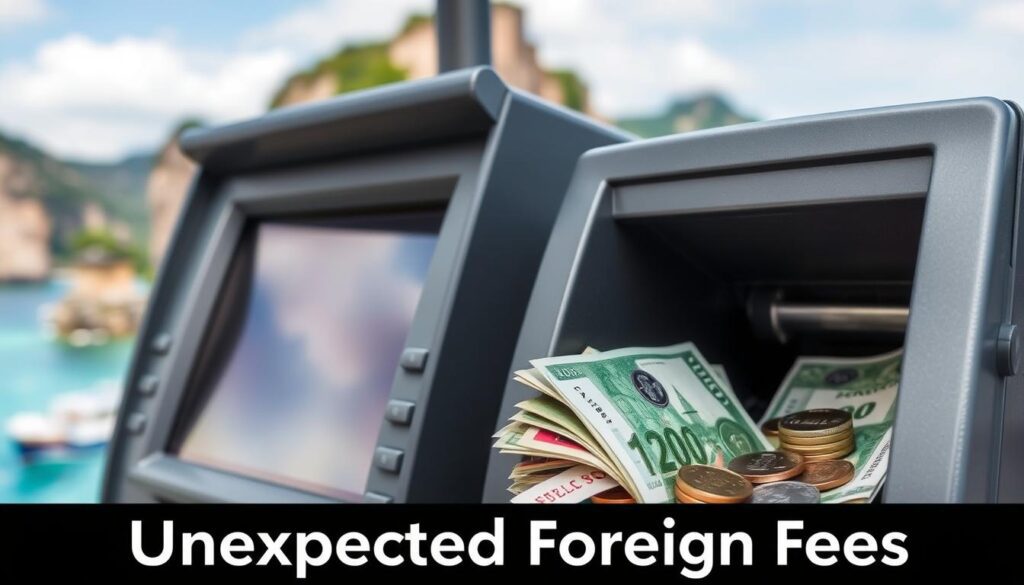
Conclusion
Traveling can be amazing, but you need to watch your money to enjoy it fully. Avoiding common mistakes like not knowing about foreign fees and not telling your bank can save you money. This way, you can make memories without worrying about money.
To enjoy your travels, learn about currency rates and use different ways to pay. Also, plan for extra costs. Being smart with your money helps you avoid money problems when traveling and saves you money. With some planning, you can travel the world without worrying about your money.
This article has given you key tips to make your next trip financially successful. By following these tips, you can enjoy your travels without worrying about money. You’ll have a great time without any financial stress.

